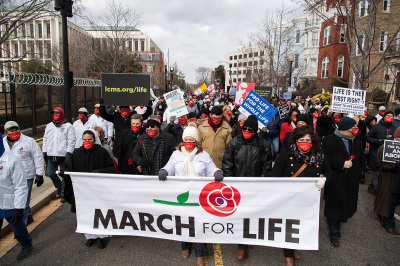Why this year’s March for Life marks a celebration of hope

Hope. Scripture says it is the essence of faith. And these are hopeful times for the pro-life faithful. Many are daring to hope the arduous quest to overturn a Supreme Court opinion that cost millions of lives over the past 50 years is almost over.
That quest began almost immediately after the Court issued Roe v. Wade, legalizing abortion across the country. The first annual March for Life was held one year later, on January 22, 1974. And it’s been an annual event ever since — drawing tens of thousands of pro-life advocates to our Capitol.
Always peaceful and surprisingly upbeat, the March in recent years has been dominated by Christian teens and 20-somethings who cannot sit idly by while their classmates and friends are sucked into a life-ending vortex that sacrifices unborn children for convenience. These dedicated young people have hope that our nation can overcome a culture of death.
This year the March is on January 21 — just 5 days after Sanctity of Human Life Sunday, when churches nationwide celebrate the sacred value of life, expected and unexpected. It’s a date chosen to correlate with the tragic day Roe was handed down. Thousands of pastors annually take this day to remind their parishioners of the assurance in Psalm 139 that God knit them together in their mother’s womb, and that they are “fearfully and wonderfully made.”
That each of us are uniquely, divinely designed is also a source of hope — even as our perceived security is threatened on all sides by pandemics, violence, and political uncertainty. The God who made us promised to be with us through it all. In fact, Paul the Apostle encouraged Roman believers to rejoice in tough times because it develops perseverance, character, and hope.
And that brings us to why the ever-hopeful pro-life movement is even more optimistic this year.
It’s been tough times since 1973. But last May, the Supreme Court agreed to take up a case challenging Mississippi’s law that protects unborn children and their mothers from dangerous and painful late-term abortions. This is a big deal, because the Supreme Court usually takes cases to reverse them. The lower courts struck down the Mississippi law because it limits abortion after 15 weeks gestation — at least 6 weeks before the baby has any hope of being viable.
Past Court decisions have severely limited pre-viability abortion regulations, based on the assumption that a state has more interest in protecting fetal life once the child has a chance of living outside the womb. That arbitrary line makes little sense, given that a child at 15 weeks has all the same limbs and organs as any other human being. Like any other child, he or she just needs time to mature. After all, even a toddler cannot survive on its own. And wouldn’t the state have more interest in protecting young life that is more vulnerable?
Based on that reasoning alone, many legal experts expect the Supreme Court to uphold Mississippi’s 15-week regulation in this case (Dobbs v. Jackson Women’s Health Organization) and allow states more freedom to protect pre-viability life. And that hope was greatly encouraged after the Court heard oral arguments on the case in December. At least 6 of the 9 justices expressed concern about a court deciding for the whole country when society has an interest in protecting unborn children and their mothers from the pain and horror of abortion.
That means there is hope that the Court will not just uphold the law, but actually overturn Roe and allow states to regulate abortion like any other medical procedure. The longing expressed by hundreds of thousands of marchers for almost 50 years would be fulfilled. The theme of thousands of Sanctity of Life Sunday sermons would be realized. And the prospect of stopping the loss of millions of unborn lives would become attainable.
Of course, we likely won’t know for sure what the Supreme Court will do till the end of its term in June. And the pessimist would remind us that Scripture also says, “hope deferred makes the heart sick.”
But the second part of that Proverb providentially declares, “a longing fulfilled is a tree of life.”
That’s a reason for faith, which is the substance of things hoped for.
Kevin Theriot is Senior Counsel with Alliance Defending Freedom (@ADFLegal).



























